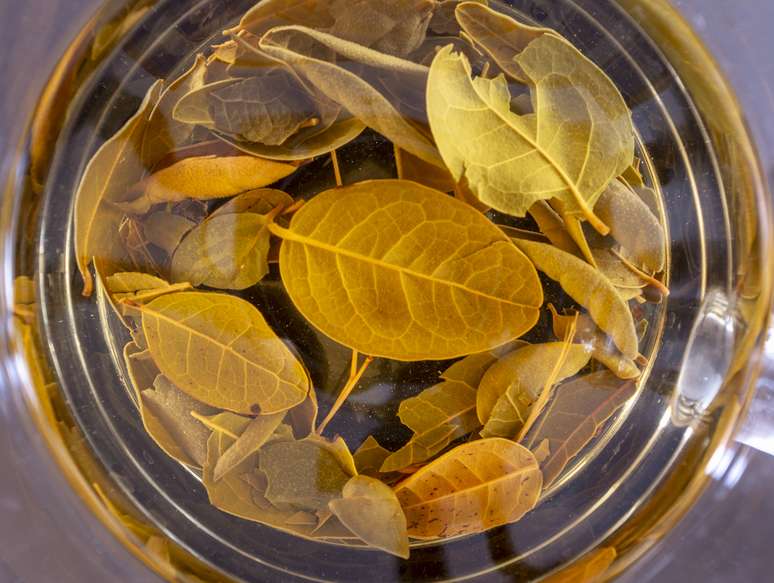Known to ease the effects of hangovers, boldo tea offers numerous health benefits; learn more about the drink.
html[data-range=”xlarge”] figure image img.img-5d40e68aaf98c297d7a542163ca6fe30vmtohzd7 { width: 774px; height: 583px; }HTML[data-range=”large”] figure image img.img-5d40e68aaf98c297d7a542163ca6fe30vmtohzd7 { width: 548px; height: 413px; }HTML[data-range=”small”] image figure img.img-5d40e68aaf98c297d7a542163ca6fe30vmtohzd7, html[data-range=”medium”] figure image img.img-5d40e68aaf98c297d7a542163ca6fe30vmtohzd7 { width: 564px; height: 425px; }
With digestive and hepatic properties, boldo tea is widely used to treat liver problems. The two most popular species of the species are the Chilean boldo (Peumus boldus molina) and the Brazilian boldo (Plectranthus barbatus), which can be found in gardens or health food stores.
In addition to its digestive functions, tea also has diuretic, anti-inflammatory and antioxidant properties. Consumed in excess, however, or for more than 30 days, the drink can cause side effects. Below we talk more about this medicinal plant and its benefits and contraindications.
What is boldo tea used for?
Boldo tea is a drink used as a natural remedy to treat various health problems, especially digestive problems. Additionally, it is also known for its antioxidant and anti-inflammatory properties and may help improve liver health and function. We explain its advantages better and detail each one below:
Aids digestion and relieves gas
By stimulating the production of digestive enzymes and containing compounds that help reduce inflammation in the gastrointestinal tract, boldo helps break down food and prevent gas from forming in the stomach, relieving symptoms of indigestion and gas.
Nutritionist Felipe França explains it best: “Certain compounds found in boldo, such as boldine, help stimulate bile production and reduce inflammation in the gastrointestinal tract, which can improve digestion and reduce gas production. Boldo has also antispasmodic properties, which help to relax the muscles of the gastrointestinal tract and reduce the feeling of abdominal discomfort”.
According to the expert, to help improve digestion and reduce the feeling of bloating, the ideal is to consume the tea before or after meals.
Improves liver health and ‘hangover cure’
The boldin present in boldo also aids in liver protection, as well as other antioxidant substances that help improve liver health and function, as it protects liver cells from oxidative damage. Due to these characteristics, do not hesitate to prepare a cup of tea when you have a hangover.
anti-inflammatory properties
With anti-inflammatory compounds, boldo may also help reduce inflammation in the body. Another benefit of tea is improved sleep quality, thanks to its relaxing properties that can help calm the nervous system.
Benefits of Boldo lemon tea
“There are no studies demonstrating the benefits of tea associated with lemon, there are studies separately demonstrating the benefits for the human body. Lemon is rich in vitamin C, antioxidants and citric acid, which can help improve digestion, reduce inflammation and protect cells against oxidative damage,” emphasizes nutritionist Felipe França.
How to consume boldo tea
-to7bv0r4lzz7.jpg)
The drink can be ingested 2 to 3 times a day, taking care not to exceed the period of 30 consecutive days. Felipe teaches some tips for preparing tea to better enjoy its properties:
- Use mineral or filtered water: the quality of the water is essential to ensure the purity and flavor of the tea. Avoid using tap water, which can contain chlorine, heavy metals and other substances that can alter the taste and quality of the tea;
- Choose fresh and good quality leaves: choose fresh and good quality boldo leaves, preferably from organic cultivation, to guarantee the tea a pleasant taste and maintain its therapeutic properties;
- Boil the water before adding the boldo leaves: Put the boldo leaves in the water after it reaches boiling point. Let the mixture boil for about 5 minutes, so that the properties of the boldo are properly extracted;
- Cover the pan during brewing: Cover the pan during the steeping process to prevent the loss of boldo’s volatile compounds, which can evaporate and reduce the potency of the tea;
- Let the tea rest before straining: After boiling boldo tea, let it steep for about 10 minutes before straining. This helps to better release the boldo properties and make the tea more concentrated;
- Do not reuse boldo leaves: After straining the tea, do not reuse boldo leaves, as they lose most of their therapeutic properties after the first brew;
What can boldo tea cause?

Although boldo tea is a medicinal plant that is widely used to treat digestive problems, its excessive use can have some risks and side effects.
gastrointestinal irritation
In some people, boldo tea can cause gastrointestinal irritation, resulting in symptoms such as nausea, vomiting, and diarrhea. Nutritionist Felipe França warns that excessive consumption of the drink also causes a decrease in the absorption of certain nutrients, especially iron and calcium, leading to nutritional deficiencies.
allergic reactions
Boldo tea can cause allergic reactions in people sensitive to its compounds, resulting in symptoms such as itching and swelling.
liver problems
The drink can irritate the liver and even cause liver damage, especially in people with pre-existing liver problems.
Abdominal pain
Excessive consumption of boldo tea can cause abdominal pain and cramping, especially in people with gastrointestinal problems.
Boldo, like other plants, can interact with some medications, including blood thinners, antidepressants, and heart medications, enhancing their effects or decreasing their effectiveness.
Contraindications of Boldo tea
Some people, however, should avoid drinking. Are they:
Pregnant women, nursing mothers and children
For pregnant and breastfeeding women, using boldo tea while pregnant and breastfeeding is not recommended, as there is evidence that the herb can have adverse effects on the fetus and baby. Boldo contains a substance called ascaridol, which has an abortifacient action and can lead to premature birth. Additionally, boldo can also cause irritation in the gastrointestinal tract and interfere with nutrient absorption, which affects the developing fetus.
“During breastfeeding, boldo should also be avoided, as the herb can be transferred into breast milk and be harmful to the baby. The roundworm present in boldo can cause irritation in the infant’s gastrointestinal tract, as well as interfere with absorption of essential nutrients for its development,” concludes Felipe.
Boldo tea is not recommended for children under the age of 6, as it may be too strong for a child’s digestive system.
People with liver problems
Boldo tea is not recommended for people with liver problems as it can aggravate the condition. “Boldo is a diuretic, that is, it increases urine output and can overload the kidneys,” says Felipe.
People with kidney problems
It is important to note that boldo contains compounds such as boldine and ascaridyl, which can have negative effects on the renal system. Boldine, for example, leads to the formation of kidney stones in some people. Roundworm, in excess, has an irritating effect on the kidneys capable of causing damage.
Source: Terra
Ben Stock is a lifestyle journalist and author at Gossipify. He writes about topics such as health, wellness, travel, food and home decor. He provides practical advice and inspiration to improve well-being, keeps readers up to date with latest lifestyle news and trends, known for his engaging writing style, in-depth analysis and unique perspectives.









